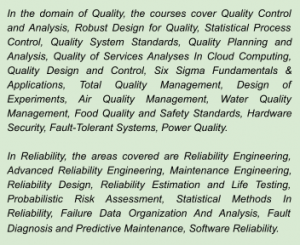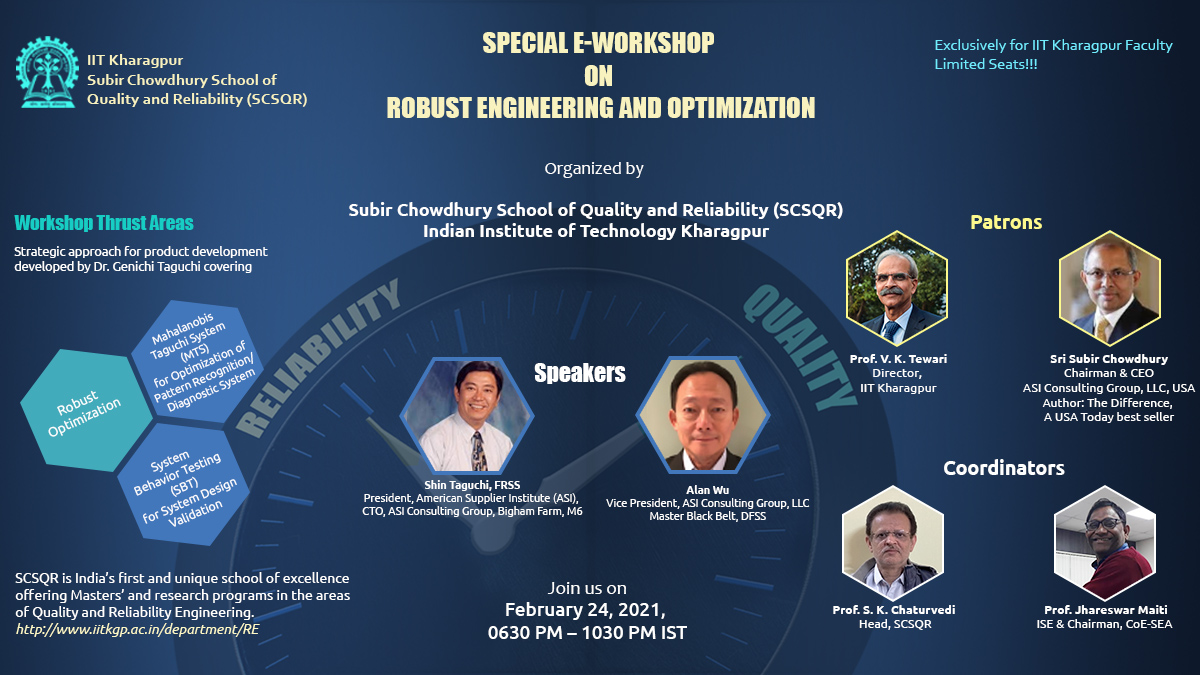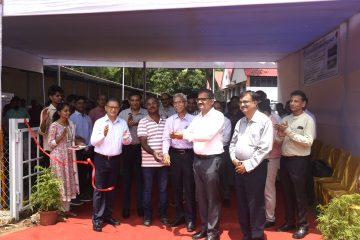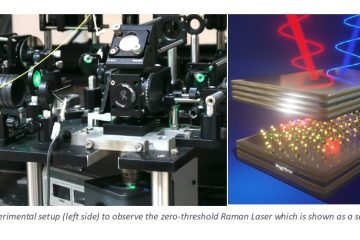“Quality combines people power and process power . . . The costs of poor quality are tangible; they will cost you customers and money, and ultimately affect the success of your business” ~ Subir Chowdhury, Quality Guru, Distinguished Alumnus Awardee
India has taken a giant step towards upgrading its manufacturing operations to Industry 4.0 and transforming into an industrial hub. As industry-oriented research, product development and IP transfer are being intensified across a wide range of advanced manufacturing, an important aspect for the industry to address is now the quality of people and process which thereby would lead to optimal product quality. Achieving this goal of India-specific quality maintenance in the industrial sector would require a whole new vertical of professionals who would be excelling in Quality and Reliability of the 3Ps – people, product and process.
IIT Kharagpur, which has pioneered in several academic disciplines in India, has taken up the responsibility to train industry professionals and academicians through courses and training modules to develop the new age quality professionals at the Subir Chowdhury School of Quality and Reliability.
Talking about the opportunities unlocked by the School, Head, Prof. Sanjay Kumar Chaturvedi said, “over the years we have experienced a great scope as well as demand for engineers from diverse backgrounds who are well-trained in quality and reliability. Our records give evidence with our graduates placed from the nuclear energy sector to defense research to automobile, steel, power, other manufacturing sectors and even IT.”
 In India, while Quality courses are offered by most of the universities as part of the industrial engineering program at the undergraduate level, specializations in quality are mainly offered by a few IITs only at the postgraduate level. However, IIT Kharagpur is the only institution in India to offer a comprehensive M.Tech. program in Quality and Reliability Engineering. Besides, the School offers MS and PhD programs in various domains of quality and reliability such as network, human, software, Maintenance Engineering, Probabilistic Risk and Safety etc.
In India, while Quality courses are offered by most of the universities as part of the industrial engineering program at the undergraduate level, specializations in quality are mainly offered by a few IITs only at the postgraduate level. However, IIT Kharagpur is the only institution in India to offer a comprehensive M.Tech. program in Quality and Reliability Engineering. Besides, the School offers MS and PhD programs in various domains of quality and reliability such as network, human, software, Maintenance Engineering, Probabilistic Risk and Safety etc.
“In addition to postgraduate degree programs in Quality and Reliability Engineering we offer core courses, electives and microspecializations to students at all levels of study. Our quality and reliability courses are offered separately without any amalgamation,” added Prof. Chaturvedi.
Further, the School has been organizing short-term courses for working professionals both from academic and industry backgrounds. Several of the industrial training programs were in-situ for industries, wherein solving a real problem from the industry by an attendee was a part of the course. In the recent past, the School has worked with top industry brands such as Siemens, Whirlpool, TVS, John Deere, Tata Steel, DRDO etc. in areas encompassing system reliability, industrial safety, risk assessment, life testing, reliability centered maintenance, product reliability assessment and assurance and many more.
Opining his vision for the School, patron Subir Chowdhury said, “The economic impact of poor quality on a nation is huge. It affects the quality of life for its citizens. The quality and reliability processes taught and practiced in India need to be upgraded to a much higher level. Since India has ambitious plans for self-sustainability in the manufacturing sector, it is necessary that the products developed and manufactured meet national and international standards in terms of quality and reliability and safety. Also in order to meet the production targets, manufacturing processes needs to be made reliable. The School can really contribute in this journey in terms of supplying training, consultancy and research.”
 Along with his organization ASI Consulting Group, USA, Subir is actively engaged in the development of academic materials, laboratories and faculty for the School. Recently in an e-workshop organized by the School in association with ASI Consulting Group international quality experts Shin Taguchi (CTO, ASI), and Alan Wu (VP, ASI) shared insights on Robust Engineering and Optimization.
Along with his organization ASI Consulting Group, USA, Subir is actively engaged in the development of academic materials, laboratories and faculty for the School. Recently in an e-workshop organized by the School in association with ASI Consulting Group international quality experts Shin Taguchi (CTO, ASI), and Alan Wu (VP, ASI) shared insights on Robust Engineering and Optimization.
Following Subir’s goal to take the concept of quality to the common citizens of India and making it their personal need and responsibility, the faculty members at Subir Chowdhury School of Quality and Reliability are in the process of organizing web-based awareness programs.
The School further aims to develop newer modules in Industry 4.0 and AIML.
Pondering on it Prof. Chaturvedi remarked, “With the aim of researching this impact as well as the utilized methods a comprehensive analysis of the effect of Industry 4.0 on quality control is imperative. The integration of wireless sensor networks and IIoT is a substantial challenge and it should be implemented to guide engineers to make the correct decisions. As a consequence, by utilizing machine learning and smart sensors, irregularities could be automatically accommodated by the process in order to guarantee the best possible quality of the final products. It is particularly important to integrate and apply the tools of Industry 4.0 to quality control in order to decidedly increase the precision of the measurement.”
More about Subir Chowdhury School of Quality and Reliability: http://www.iitkgp.ac.in/department/RE
The article has been written in collaboration with various authors from the Subir Chowdhury School of Quality and Reliability



